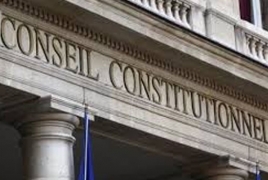France's Constitutional Council backs eavesdropping law July 24, 2015 - 11:30 AMT PanARMENIAN.Net - France's Constitutional Council on Thursday, July 23, broadly approved a law giving state intelligence services more scope to eavesdrop on the public to tackle what authorities have described as an unprecedented terror threat, Reuters reports. The surveillance law, unveiled in March two months after 17 people were killed by homegrown Islamist gunmen in Paris, has drawn comparisons with the U.S. Patriot Act introduced after the Sept. 11, 2001 attacks on the United States. President Francois Hollande himself was among those who asked the Council to rule on the constitutionality of a law that waives the need for warrants to use phone taps, cameras and hidden microphones and allows authorities to force Internet providers to monitor suspicious behavior. His government has said it expressly forbids bulk collection of telephone records as has been done by the U.S. National Security Agency, but civil rights groups have argued that its provisions could amount to mass surveillance and are lacking sufficient checks and balances. Instead of requiring a judge's approval, security officials can under the new law order surveillance after advice by a newly created supervisory body specifically dedicated to such approvals. The Constitutional Council rejected an article that would have allowed authorities to conduct operations in emergency situations without approval. It also rejected an article on international surveillance on the grounds that lawmakers had not sufficiently defined conditions for its use, according to Reuters. Hollande's office said in a statement that the rejection of the two articles did not deprive intelligence agencies of means to protect citizens and French interests. Under the new law, surveillance agencies will in exceptional cases be able to use so-called "IMSI Catcher" spy devices that record all types of telephone, Internet or text-messaging conversations in an area. They will also be able to bug suspects' flats with microphones and cameras and add "keyloggers" to their computers to track every keystroke. The law also allows authorities to require Internet providers to track suspicious behavior by monitoring so-called "metadata," for example the time and frequency of use of a given site, but not the actual content of any communications. France's Digital Council, an independent commission that advises the government on the effects of digital technologies on society, welcomed the clearer controls on surveillance but said the bill did not adequately protect civil liberties. Authorities said a total of 192 Azerbaijani troops were killed and 511 were wounded during Azerbaijan’s offensive. In 2023, the Azerbaijani government will increase the country’s defense budget by more than 1.1 billion manats ($650 million). The bill, published on Monday, is designed to "eliminate the shortcomings of an unreasonably broad interpretation of the key concept of "compatriot". The earthquake caused a temporary blackout, damaged many buildings and closed a number of rural roads. Partner news |